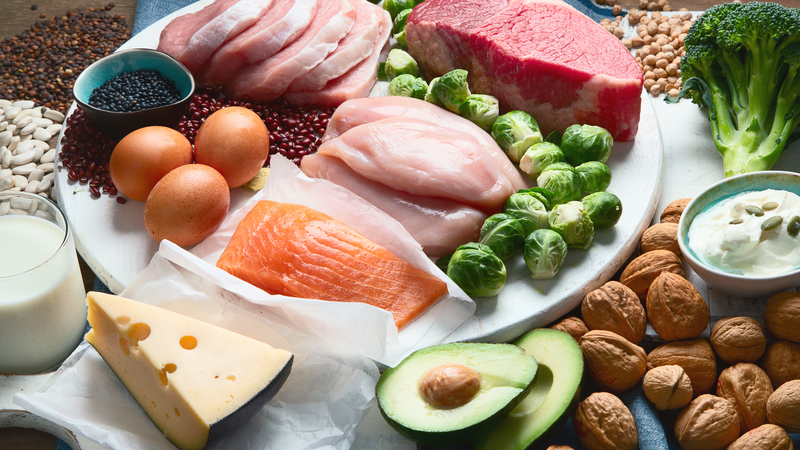For your body to function properly, you need to consume the three macronutrients that help fuel your energy systems: carbohydrates, fats and proteins. The main function of carbohydrates and fats is to provide the body with energy, also known as ATP. Proteins, on the other hand, are mainly used to help your body build and repair cells, including cells that are damaged while exercising.
When you exercise, especially when you lift weights and perform explosive plyometrics, the cells in your muscles break apart and become damaged. When this occurs, they need to be rebuilt to become stronger — and they need access to protein to do so.
A sufficient amount of protein should make up about 10-35% of your daily caloric intake depending on your activity level. Those with higher activity levels should consume more protein. However, even though protein is vital for muscle growth, eating too much protein can lead to adverse effects.
Because the protein in your body is processed by your kidneys, excessive protein will be eliminated by the body as waste. This in itself is a good thing, but overconsuming protein too often can put an excessive workload on your kidneys, which can lead to complications down the road.
Thankfully, it can be simple to figure out the right amount of protein for your body. For many people, 0.5 grams of protein per pound of bodyweight is sufficient. If you live a more active lifestyle and exercise regularly, it is safe to consume around 0.65 grams per pound of bodyweight. High-level athletes and individuals who do a lot of weight lifting and physically demanding activities should consume 1 gram of protein per pound of bodyweight.
Once you determine the amount of protein you should consume, keep track of your intake by checking nutrition labels and adding your totals. For guidance on healthy protein sources, check out the chart below.
| Animal Based | Grams Per Serving | Vegan Based | Grams Per Serving |
| Skinless chicken breast | 3 ounces = 28 grams | Soy (edamame, soy milk, tofu) | ½ cup tofu = 10 grams |
| Pork | 3 ounces = 22 grams | Nuts (almonds, peanuts, walnuts) | 2 Tablespoons almonds = 3 grams |
| Steak (lean cut) | 3 ounces = 26 grams | Beans (lentils, chickpeas, black beans) | ½ cup black beans = 7 grams |
| Egg, large | 6 grams | Grains (spaghetti, rolled oats, quinoa) | ½ cup rolled oats = 7 grams |
| Dairy products (milk, yogurt, cheese) | 1 cup yogurt = 12 grams | Veggies (spinach, potatoes, broccoli) | 1 cup cooked spinach = 5 grams |
| Seafood (salmon, tuna, shrimp) | 4 ounces salmon = 27 grams | Seeds (sunflower, chia) | 1 ounce chia seeds = 4.7 grams |
By: Jenna Linstra

